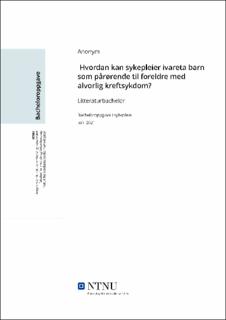Hvordan kan sykepleier ivareta barn som pårørende til foreldre med alvorlig kreftsykdom?
Bachelor thesis
Permanent lenke
https://hdl.handle.net/11250/2782861Utgivelsesdato
2021Metadata
Vis full innførselSamlinger
Sammendrag
Bakgrunn: I Norge opplever rundt 3500 barn årlig at deres mor eller far blir syke av kreft. Som helsepersonell pliktes sykepleier av helsepersonell-loven §10a å ivareta barn som pårørende. Mangel på informasjon og inkludering i foreldrenes sykdom kan føre til utfordringer for barna. Hensikt: Finne ut hvordan sykepleier kan ivareta barn som pårørende på best måte.Hensikt: Hensikten med litteraturstudien er å finne ut hvordan sykepleier kan ivareta barn som pårørende på en god og hensiktsmessig måte.Metode: Litteraturstudie basert på tidligere forskning.Resultat: Barn trenger å bli sett og ivaretatt av sykepleiere. De ønsker å involveres i situasjonen og trenger utenforstående å snakke med. Barna takler foreldrenes sykdom bedre sammen med andre som står i samme situasjon og har også behov for å koble av å tenke på andre ting enn sykdom. Tilstrekkelig informasjon tidlig i sykdomsforløpet forebygger misforståelser, stress og engstelse for barna. Sykepleierne ønsker mer kompetanse og opplæring i arbeidet med barn som pårørende. De ønsker å skape et bedre miljø for barn som følger sine foreldre på sykehus, samt skape en holdningsendring blant sykepleierne i avdeling.Konklusjon: Sykepleierne ønsker mer støtte fra ledelsen og implementering av rutiner for arbeidet med barn som pårørende. Bedre opplæring er avgjørende for at barn skal bli identifisert som pårørende, og for at barna skal få oppfølging og ivaretakelse i et system. Nøkkelord: Kreft, barn, pårørende, mestringsstrategi og sykepleie. Background: In Norway, around 3,500 children experience annually that their mother or father becomes ill from cancer. As a healthcare professional, a nurse is obliged by section 10a of the Health Personnel Act to look after children as relatives (next of kin). Their lack of information and inclusion in the parents' illness can lead to challenges for the children.Objective: To find out how nurses can best look after these children as next of kin.Method: Literature study. Result: Children need to be seen and looked after by nurses. They have to be involved in the health situation of their parents and needs adults and specialists supports. The children cope better with their parents' illness together with others who are in the same situation, in order to divert their thoughts and focus on other relevant things other than sorrow. Adequate and early information in the course of the disease prevents misunderstandings, stress and anxiety for these children. Nurses thus requires more competence and training in working with children as next of kin. They have to create better environments for children who follow their parents to the hospitals, as well as create a change in attitudes among the nurses in the ward.Conclusion: The nurses need more support from management in the implementation of routines for working with children as next of kin. Better training is essential for children to be identified as next of kin, and for the children to receive follow-up and care in the health system.Keywords: Cancer, children, next of kin, coping strategy, nursing.
